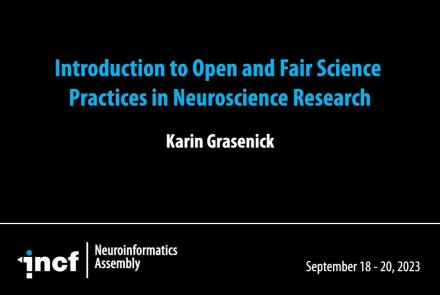This brief video provides an introduction to the session "Is This FAIR?": Transparency in EDI, Career Development, & Management.
Difficulty level: Beginner
Duration: 4:50
Speaker: : Tanya Brown
In this lesson, you will learn about how team science unfolds in practice, as well as what are the standards and best practices used by teams, and how well these best practices function and support scientific output.
Difficulty level: Beginner
Duration: 15:21
Speaker: : Hannah Bayer
In this lesson, you will learn about approaches to make the field of neuroscience more open and fair, particularly regarding the integration of equality, diversity, and inclusion (EDI) as guiding principles for team collaboration.
Difficulty level: Beginner
Duration: 14:11
Speaker: : Karin Grasenick
This lesson discusses the topic of credit and contribution in open and FAIR neuroscience, looking through the respective lenses of systems, teams, and people.
Difficulty level: Beginner
Duration: 24:34
Speaker: : Tanya Brown
In this talk, you will hear about the challenges and costs of being FAIR in the many scientific fields, as well as opportunities to transform the ecology of the academic crediting system.
Difficulty level: Beginner
Duration: 14:56
Speaker: : Zefan Zheng
This lesson consists of a brief discussion around this sessions previous talks.
Difficulty level: Beginner
Duration: 12:43
This brief talk goes into work being done at The Alan Turing Institute to solve real-world challenges and democratize computer vision methods to support interdisciplinary and international researchers.
Difficulty level: Beginner
Duration: 7:10
Speaker: : Alden Connor & Beatriz Costa Gomes
This lightning talk describes the heterogeneity of the MR field regarding types of scanners, data formats, protocols, and software/hardware versions, as well as the challenges and opportunities for unifying these datasets in a common interface, MRdataset.
Difficulty level: Beginner
Duration: 5:15
Speaker: : Harsh Sinha
This brief talk describes the challenge of global data sharing and governance, as well as efforts of the the Brain Research International Data Governance & Exchange (BRIDGE) to develop ready-made workflows to share data globally.
Difficulty level: Beginner
Duration: 6:47
Speaker: : Kimberly Ray
This lesson describes the current state of brain-computer interface (BCI) standards, including the present obstacles hindering the forward movement of BCI standardization as well as future steps aimed at solving this problem.
Difficulty level: Beginner
Duration: 15:01
Speaker: : Martijn de Neeling
This talk describes how to use DataLad for your data management and curation techniques when dealing with animal datasets, which often contain several disparate types of data, including MRI, microscopy, histology, electrocorticography, and behavioral measurements.
Difficulty level: Beginner
Duration: 3:35
Speaker: : Aref Kalantari Sarcheshmeh
This lightning talk gives an outline of the DataLad ecosystem for large-scale collaborations, and how DataLad addresses challenges that may arise in such research cooperations.
Difficulty level: Beginner
Duration: 2:54
Speaker: : Michał Szczepanik
This talk gives a brief overview of current efforts to collect and share the Brain Reference Architecture (BRA) data involved in the construction of a whole-brain architecture that assigns functions to major brain organs.
Difficulty level: Beginner
Duration: 4:02
Speaker: : Yoshimasa Tawatsuj
This brief talk covers an analysis technique for multi-band, multi-echo fMRI data, applying a denoising framework which can be used in an automated pipeline.
Difficulty level: Beginner
Duration: 4:45
Speaker: : David Abbott
This lesson is the first part of a three-part series on the development of neuroinformatic infrastructure to ensure compliance with European data privacy standards and laws.
Difficulty level: Beginner
Duration: 1:10:05
Speaker: : Michael Schirner
This is the second of three lectures around current challenges and opportunities facing neuroinformatic infrastructure for handling sensitive data.
Difficulty level: Beginner
Duration: 48:26
Speaker: : Michael Schirner
This is the third and final lecture of this course on neuroinformatics infrastructure for handling sensitive data.
Difficulty level: Beginner
Duration: 1:11:22
Speaker: : Michael Schirner
This lesson gives a quick introduction to the rest of this course, Research Workflows for Collaborative Neuroscience.
Difficulty level: Beginner
Duration: 3:23
Speaker: : Dimitri Yatsenko
This lesson provides an overview of how to conceptualize, design, implement, and maintain neuroscientific pipelines in via the cloud-based computational reproducibility platform Code Ocean.
Difficulty level: Beginner
Duration: 17:01
Speaker: : David Feng
In this workshop talk, you will receive a tour of the Code Ocean ScienceOps Platform, a centralized cloud workspace for all teams.
Difficulty level: Beginner
Duration: 10:24
Speaker: : Frank Zappulla
Topics
- Artificial Intelligence (6)
- Philosophy of Science (5)
- Provenance (2)
- protein-protein interactions (1)
- Extracellular signaling (1)
- Animal models (6)
- Assembly 2021 (29)
- Brain-hardware interfaces (13)
- Clinical neuroscience (17)
- International Brain Initiative (2)
- Repositories and science gateways (11)
- Resources (6)
- (-)
General neuroscience
(45)
- Neuroscience (9)
- Cognitive Science (7)
- Cell signaling (3)
- Brain networks (4)
- Glia (1)
- Electrophysiology (16)
- Learning and memory (3)
- Neuroanatomy (17)
- Neurobiology (7)
- Neurodegeneration (1)
- Neuroimmunology (1)
- Neural networks (4)
- Neurophysiology (22)
- Neuropharmacology (2)
- Synaptic plasticity (2)
- Visual system (12)
- Phenome (1)
- General neuroinformatics
(15)
- Computational neuroscience (195)
- Statistics (2)
- Computer Science (15)
- (-) Genomics (26)
- Data science
(24)
- Open science (56)
- Project management (7)
- Education (3)
- Publishing (4)
- (-) Neuroethics (37)




















